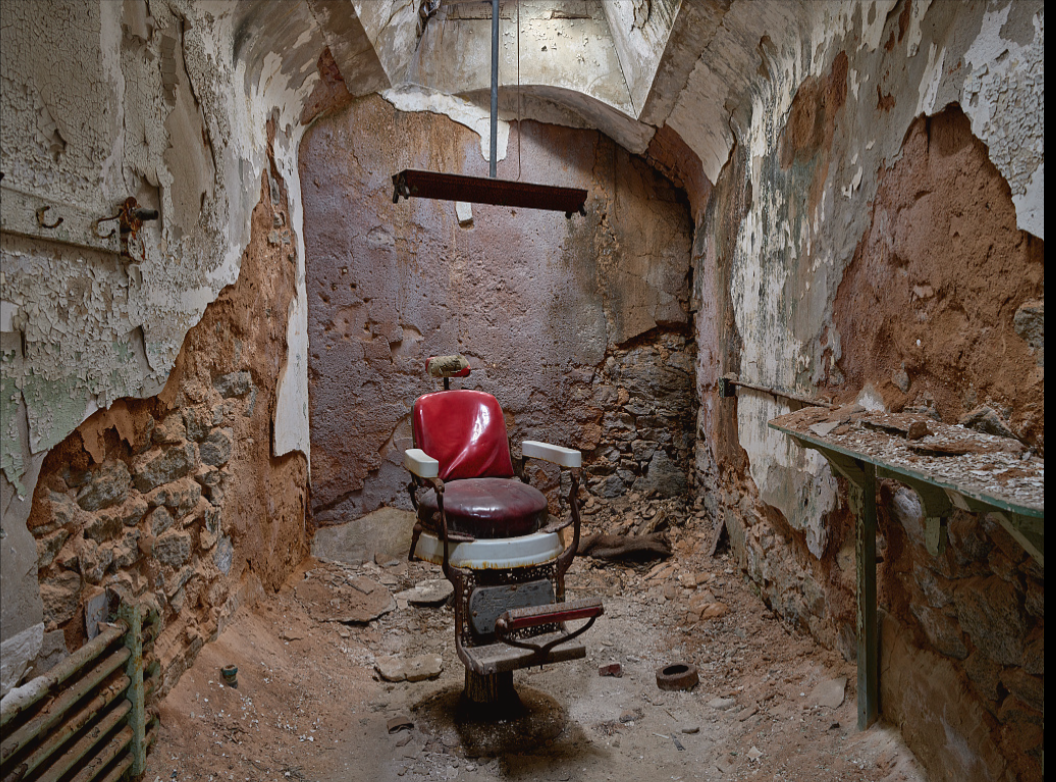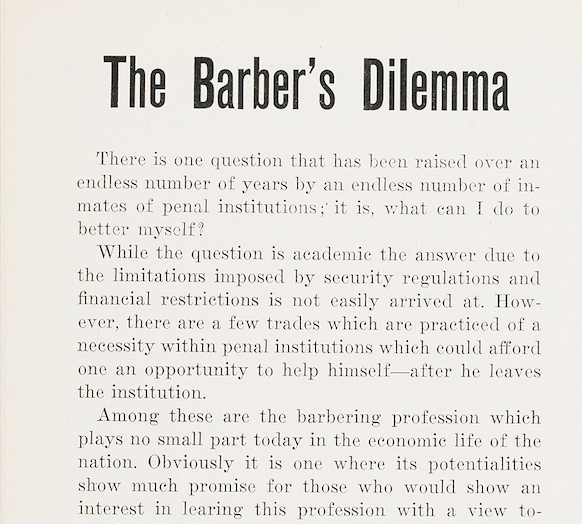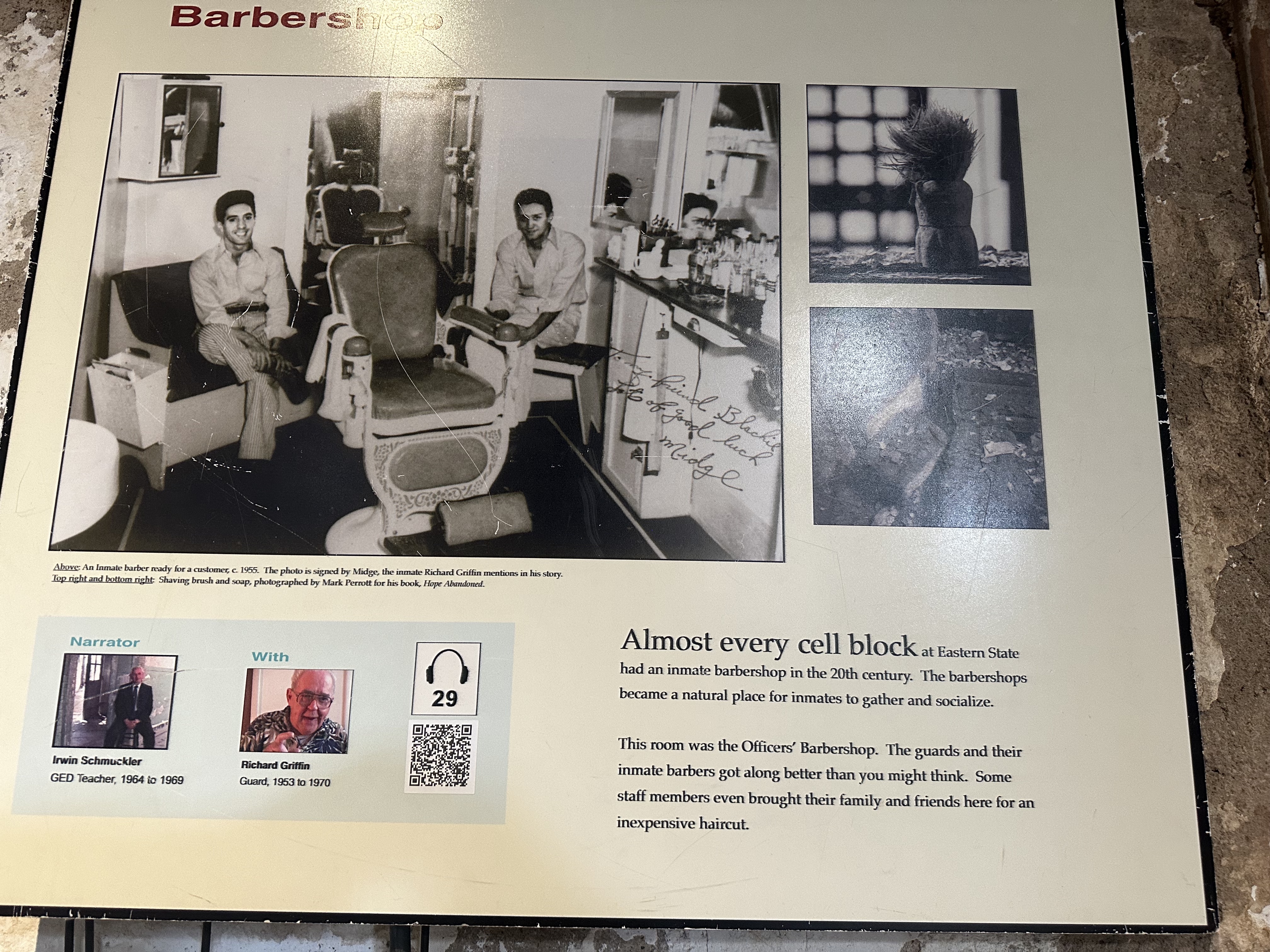Established 2023
Barbershop Talks Behind Bars
Monday, November 11, 2024
Jayson Mack
Barbershop Talks Behind Bars: The Forgotten Community Spaces of Eastern State Penitentiary
When thinking about life in prisons, community is not typically the first thing that
comes to mind, especially at Eastern State Penitentiary in Philadelphia, Pennsylvania.
The harsh conditions of Eastern State pioneered models for prisons across the country.
In 1829, the City of Philadelphia legislation passed a law permitting inmates to be
seperate and silent 23 hours of the day, with the intention of forcing inmates to drown
in reflection of their ugly behavior. This system, later to be referred to as the Philadelphia
System aimed to have inmates grow to become genuinely penitent through isolation methods, which
is where the new term for prisons, Penitentiary, was birthed.
Despite the dehumanizing conditions present in Eastern State, certain spaces within the prison, like the barbershop, fostered a sense of community both within the prison walls and beyond.
Growing up, I spent much time in a barbershop, a place where my friends and I
would hang out even if we weren’t there for haircuts. We would talk about
everything from debates on LeBron vs. Jordan, and discussions about building generational wealth,
to even casual conversations about upcoming school assignments. The barbershop was a
place where I, as a Black man, felt free to express my feelings and emotions.
After school, if my friends and I wanted to avoid chores at home, we’d stop
by the barbershop to check in with our barber-mentor, play video games, and relax.
I never took this space for granted because there aren’t many places offering
the same freedom that barbershops provide Black men across America.
Breaking the Code: Creating Communal Spaces

Similarly, barbershops at Eastern State Penitentiary played a major role in establishing
a sense of community which the prison lacked due to the harsh social restricitions. Historical records
found in Eastern State archives indicate that each cell block had at least one vacant cell set aside as a
barbershop, quickly becoming a communal hub. In a prison where inmates were rarely granted
the freedom to spend time outside of their personal cells, these barbershops offered an outlet
for human interaction. While sports like baseball fostered a sense of community outdoors,
inside the cell blocks, barbershops were one of the few spaces where inmates could
simply be human.
Even the prison guards participated in this communal space, sometimes receiving haircuts
from inmate barbers and even bringing in family members as clients. This interaction
suggests a level of trust from guards, who, despite often having antagonistic relationships
with inmates, saw the barbershops as a place to connect. A guard would not recommend
a barber to friends and family if they didn’t trust the quality of the haircut.
Historically, interactions between guards and inmates were minimized due to inmates being hooded
anytime they left their cell, however the barbershops provided a community to counteract those limitations.
This newly established dynamic reflects the community-building power of the barbershop, bringing people
together in an environment intended to be unbearable.
Contributing to Prison Community and Beyond
In a setting where prisoners were often stripped of their freedom to talk openly,
these barbershops were incredibly valuable. Men have historically faced societal challenges
in expressing their emotions, and prisoners had even fewer outlets. The opportunity
to socialize in a barbershop likely boosted many inmates’ mental health as they escaped,
even briefly, the isolation that defined prison life. But the freedom provided by
these barbershops extended beyond socializing. Barbershops also fostered economic growth
within the prison and helped prepare inmates for potential careers on the outside.

Operating a barbershop business within the prison equipped inmates with specific skills
and experience that could support a career as a barber post-release. According to
the Eastern Echo Newspaper, the State Barber Board required inmate barbers to pass
a written exam and demonstrate specialized barbering skills to earn their title. This
practical training and qualification process gave inmates a sense of purpose and perhaps
encouraged them to build a better life upon release. Black barbershops have been essential
contributors to the culture and economic growth of inner cities across the United States,
and the skills honed within prison barbershops connect directly to this historical legacy.
In all, the prison barbershop was more than a place to get a haircut; it was a space
for fostering relationships, improving mental health, and promoting economic growth both
inside and outside of Eastern State Penitentiary. The barbershops within Eastern State
mirrored the historical significance that barbershops have held in communities nationwide,
particularly within African American communities. For the inmates of Eastern State,
these spaces were a reminder of freedom, connection, and the possibilities that lay ahead.

References
- Eastern Echo Newspaper.(1962)
- Library of Congress. Vacant Barbershop Cell.
- Eastern State Penitentiary Exhibit.
- I utilized artificial intelligence system ChatGPT4 to help me come up with a title for my news article as well as to proofread my text to ensure that my blog post is grammatically correct.
